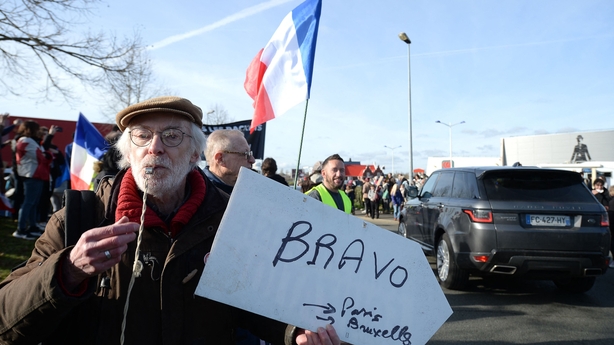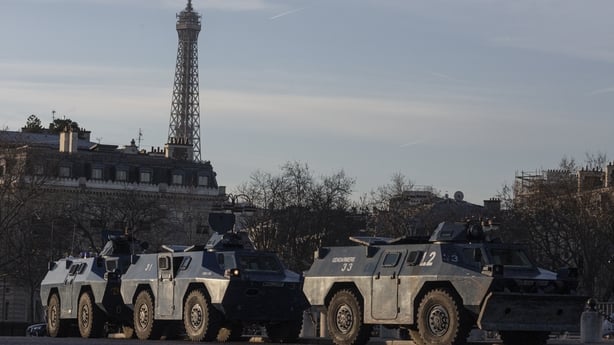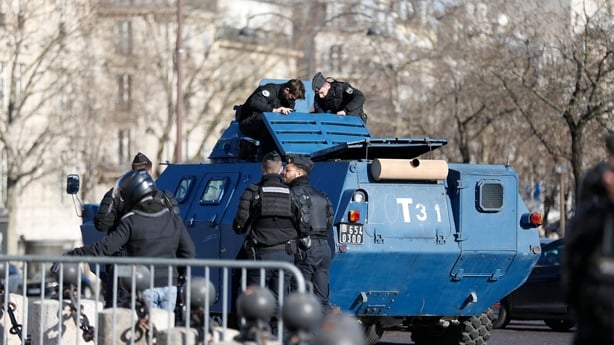French police have fired tear gas at demonstrators on the Champs Elysees avenue in Paris, shortly after a "Freedom Convoy" protesting against Covid-19 restrictions made it into the capital.
Cars carrying protesters managed to get through police checkpoints in central Paris to snarl traffic around the Arc de Triomphe monument.
Inspired by horn-blaring "Freedom Convoy" demonstrations in Canada, the motorists waved French flags and honked in defiance of a police order not to enter the city.
Police told protesters to move on as some climbed on their cars in the middle of the roundabout at the top of the Champs Elysees.
Thousands of the protesters encamped on the outskirts of Paris and resumed their way to the French capital this morning, defying a ban by authorities who are determined to prevent any blockade of the city.
Some drivers parked on the fringes of Chartres, about 80km from Paris, left at around 5am, according to messages seen by AFP.

Messages said the aim was to "create a mass of vehicles that the forces of order would find impossible to contain".
Earlier police said they had stopped 500 vehicles that were trying to get into Paris and nearly 300 tickets were handed out to their occupants by mid-morning, police said.
Less than two months from a presidential election, President Emmanuel Macron's government is eager to keep protests from spiralling into large-scale demonstrations like the anti-government "Yellow Vest" protests of 2018.

Separately police also said they had arrested five protesters in southern Paris in possession of sling shots, hammers, knives and gas masks.
Police had mobilised more than 7,000 officers, set up checkpoints and deployed armoured personnel carriers and water cannon trucks in preparation for the protests.
Canadian truckers protesting a vaccine mandate for trans-border traffic have paralysed parts of the capital Ottawa since late January and blocked US-Canada crossing points.
The French protests are against rules requiring a vaccine pass to enter many public places and come after months of regular demonstrations against the pass in Paris and other cities.
The Yellow Vest movement which began as a protest against fuel taxes grew into a broader revolt that saw some of the worst street violence in decades and tested Mr Macron's authority.
Police have allowed two street marches by anti-vaccine and Yellow Vest demonstrators to go ahead in Paris this afternoon.
The prefect of the Paris police, Didier Lallement, said they had created a temporary car pound which, together with dozens of tow trucks, "will ... put an end to any blockage".
Police showed off their anti-blockage arsenal on Twitter, publishing photographs of loader tractors for the removal of barricades, as well as trucks equipped with cranes or water cannon.
Gendarmerie armoured vehicles have also been deployed in the streets of the capital for the first time since the "yellow vest" protests at the end of 2018.
Prime Minister Jean Castex vowed to remain steadfast.
"If they block traffic or if they try to block the capital, we must be very firm about this," he said.
Hundreds of cars, motorhomes and vans from Lille, Strasbourg, Chateaubourg and elsewhere stopped yesterday evening at the gates of Paris, but a police source said no convoy had entered the capital.
They are demanding a withdrawal of the government's vaccine pass, which is required for access to many public spaces, and more help with their energy bills.
Just two months ahead of presidential elections and with the government desperate to avoid violent scenes in the capital, French President Emmanuel Macron said yesterday that he understood the "fatigue" linked to the Covid-19 pandemic.

"This fatigue also leads to anger. I understand it and I respect it. But I call for the utmost calm," he told the Ouest-France newspaper.
Police estimated 3,300 vehicles were involved in the various convoys by yesterday afternoon.
Paris police banned the gathering because of feared "public order disturbances" and said protesters who tried to block roads would face fines or arrest.
The order prohibiting the assembly of convoys was upheld by the courts, which rejected two appeals.

